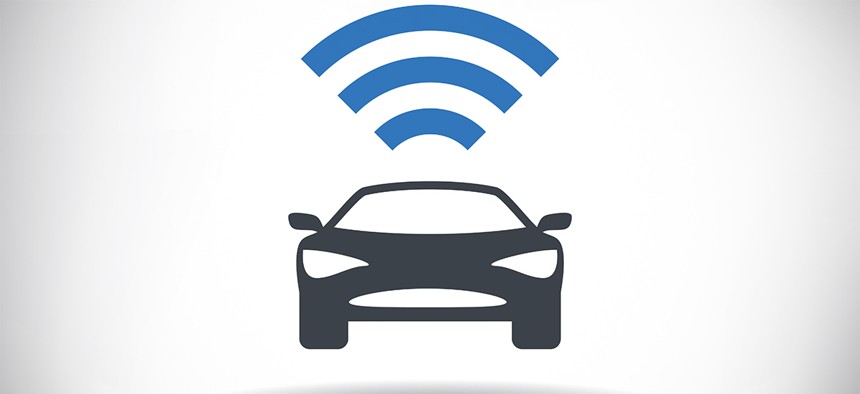Lawmakers Worry Malicious Hackers Could Take Control of Your Car

Blue Island/Shutterstock.com
The House oversight committee held a hearing about potential cybercrime in connected cars.
New car models, equipped with technology such as lane-changing alerts or blind-spot and collision warning systems, often rely on a wireless network quietly collecting data on drivers.
Some auto manufacturers argue that this data -- geo-location, driving behavior, temperature preferences -- helps their driving software learn, adapting to the car owners' individual needs in real-time and adjusting controls accordingly.
But lawmakers, irked partly by a Wired report from the summer detailing how researchers remotely disabled a Jeep's breaks and controlled steering, are increasingly concerned that "connected cars" are vulnerable to cyberattack, even putting drivers in physical danger.
In a hearing Wednesday, the House Committee on Oversight and Government Reform convened auto industry executives to debate Congress' role in regulating the emerging business. (Toyota, represented at the hearing, recently added a new business department focused on connected cars, the Wall Street Journal reported.)
The hearing is just one of many congressional attempts to address connected cars. Earlier this month, Rep. Ted Lieu, D-Calif., introduced the Security and Privacy in Your Car Study Act, which would task the National Highway Safety Transportation Commission with a 1-year study on a potential regulatory framework for car software cybersecurity standards. Sens. Richard Blumenthal, D-Conn., and Ed Markey, D-Mass., introduced similar legislation in July.
So far, there have been no documented malicious attempts to hack into consumers' cars, lawmakers acknowledged.
Here are a few takeaways from that hearing:
1. Automakers, lawmakers and consumer privacy advocates disagree on the relative importance of privacy and data security for consumers.
Citing the recent terrorist attacks in Paris during which terrorists were at first purported to have used encrypted networks to communicate, Rep. Jason Chaffetz, R-Utah, mused to witnesses, “how much privacy are we going to give up in the name of security?”
He later asked how feasible it would be for car systems to have virtual "keys" consumers could voluntarily give to tech support at will. He also suggested "carve-outs" that might grant law enforcement access to certain data, such as geo-location, although only in extreme cases such as those involving terrorist activity.
"If you're a suspicionless American, if you're somebody who is leading a good, decent, honest life, I think you have an expectation of privacy in this nation and that will certainly come into play not only with cars, but the Internet of Things," he said.
Dean Garfield, president and chief executive of advocacy group the Information Technology Industry Council, warned that keys, or data back doors, could be exploited if they fall into a malicious hacker's possession. Especially in networks of cars communicating with each other, "you’re entrusting one person who may be vulnerable to being compromised with the security for everyone," he said.
Diarmuid O’Connell, vice president of corporate and business development at Tesla Motors, argued that open systems are better for technologists, who want to experiment with and improve on connected car technology.
"I think it's an issue of philosophy," O'Connell said. "It's a dynamic process, but it's one where I guess you vest hope, either in the inherent goodness of man, or the inherent badness of man. And I prefer to vote for the former. I think that it's the minority that are malignant, and that in a truly open system where innovation is encouraged and rewarded, and where there are sufficient penalties for malignant behavior, you're going to see a net positive benefit over the course of time."
2. The National Highway Traffic Safety Administration is proposing "Dedicated Short Range Communications" devices for cars and roadside structures such as traffic lights, so these objects can communicate their locations to each other and potentially prevent crashes. Some think this technology should be developed by the private sector.
NHTSA Associate Administrator for Vehicle Safety Research Nat Beuse testified the Transportation Department is "putting hardware behind" a vehicle-to-vehicle communication system, and that it plans to put the technology proposal out for public comment in 2016.
During the hearing, Rep. Will Hurd, R-Texas, pointed to large-scale federal technology failures -- the departments of Defense and Veterans Affairs' attempt to join their electronic health records systems and the recent Office of Personnel Management data breach that exposed personal information from 22 million people.
"I'm always concerned when we put too much faith in federal agencies to protect our information," Hurd said. ”Why are we even thinking about the federal government getting involved in this ... [if] the private sector's going to be a little better equipped to develop the technology?"
3. Lawmakers are still debating how car-based cybercrime regulations might differ from other types of cybercrime.
“The question is whether automotive best practices would look any different than existing best practices that guide cybersecurity in other contexts," said Sandy Lobenstein, vice president of connected services and product planning at Toyota Motor North America, Inc., during the hearing.
He and other witnesses also argued that private sector technology development would likely outpace the federal regulations governing them.
Lieu acknowledged "regulation can be slow, rigid, and discourage innovation if done wrong." But, he added, "rushing to regulation is not, in my opinion, the answer, but neither is a lack of accountability and standards."
NEXT STORY: IG: OPM still vulnerable to cyber attacks





